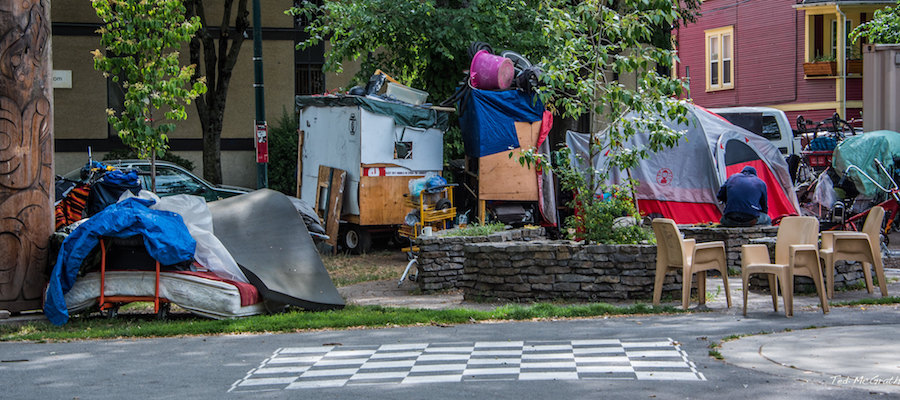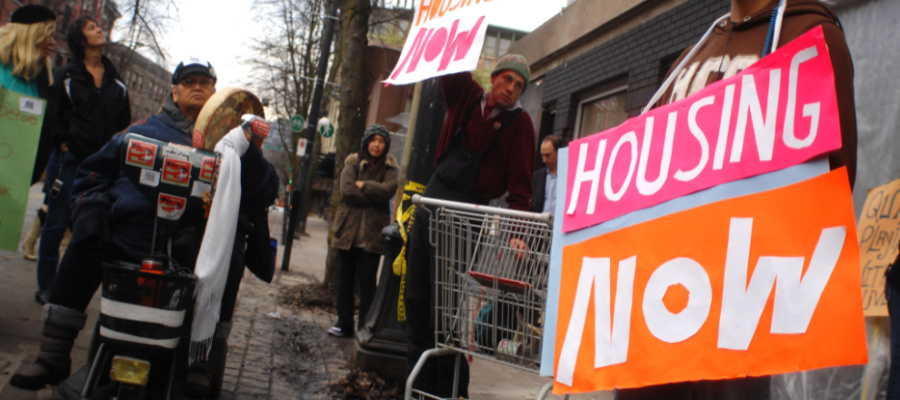Dismantling tent cities—why choice matters

“When you live on the street long enough, eventually you stop believing in choices. Where you eat, sleep and even socialize is decided for you.”– Kris Cronk, Megaphone Speakers’ Bureau Facilitator and Vendor.[1]
“When you live on the street long enough, eventually you stop believing in choices. Where you eat, sleep and even socialize is decided for you.”– Kris Cronk, Megaphone Speakers’ Bureau Facilitator and Vendor.[1]
On April 25, 2020 the BC government announced a plan to evacuate tent city communities in Vancouver and Victoria and place residents in temporary accommodations.[2] There have been many calls from community urging the government to recognize that people experiencing homelessness are disproportionately vulnerable to COVID-19 and other health and human rights issues.
We commend efforts to offer housing and services to people experiencing homelessness. Such services are important for people experiencing homelessness to be able to physically distance and care for themselves during the pandemic. The announcement is a positive and substantive move to invest in crucially needed supports.
However, the announcement came by way of a public safety order, enforceable by police, instead of a public health order that would recognize the health-related needs of the people in the tent cities. The inference is that tent cities are a community safety risk and the primary goal is to dismantle them, not to support health. People forced to leave the areas will be offered temporary shelter in community centres or hotel rooms, with details still being determined.
In this context, we call on BC to ensure that choice and self-determination are necessary elements of the transition for people living in the encampments.
Remember, we got here by removing choices
Tent cities sprung up in response to years of government failure to provide options of safe and secure housing and health supports. The increase in visible homelessness and tent cities in communities throughout BC over the past number of years is a product of a housing affordability crisis, a harmful approach to drug policy, and a lack of person-centred, voluntary mental health supports. It’s a sign of failure of many public systems to recognize that people need community, self-determination, and inclusion to live with dignity.
People living in tent cities have often said they choose to live in an encampment over temporary shelters or in supported housing where they feel a lack of choice, safety, and dignity. This is shown in court cases where people living in tent cities reported feeling safer and more supported in those communities.[3]
Sometimes this is the result of a mismatch in housing needs—many people in tent cities do not need the level of service that comes with supported housing, but there is no other affordable housing available to them. For others, these feelings are the result of the way we design and deliver services. Many people have had negative experiences with health and social service systems that take away their ability to make their own choices in their lives. This compounds the fact that poverty, disability, discrimination, marginalization, and exclusion already erode autonomy and dignity, evidenced by the fact that people experiencing homeless are already more vulnerable to COVID-19.
Why choice matters when it comes to health and housing
At first glance, it is easy to dismiss the concerns about autonomy and self-determination by assuming that people living in tent cities should just be grateful to be offered housing. But that ignores the role self-determination and autonomy plays in our health and wellbeing. In fact, because people who experience multiple forms of exclusion have so many of their choices taken away, providing housing and services is not effective unless autonomy and self-determination is supported.
Research has shown that providing people with choices and autonomy results in better health outcomes and improved wellbeing. Self-determination is a fundamental practice of the Housing First model, one of the most rigorously evaluated approaches to supporting highly marginalized people experiencing homeless and mental health and/or substance use issues.[4]
While offering housing and wraparound services to those in tent cities is an important and long overdue step, forcing an evacuation may backfire by further alienating people from the supported housing and services that may have the potential to support their health.
Autonomy is a fundamental aspect of being human—we need it to live with dignity and be full participants in our community. We also need it to achieve our best health outcomes. Self-determination and autonomy must be fundamental aspects of the emerging response to tent cities and homelessness in the midst of COVID-19.
This article was originally published by Health Justice.
Notes
[1] Kris Cronk, Megaphone’s Speakers Bureau, “Dear Pen Pals” (11 September 2019), online at http://speakersbureau.megaphonemagazine.com/panhandling.
[2] BC Government News Release (25 April 2020), online at: https://news.gov.bc.ca/releases/2020EMBC0020-000759. Also see Ministerial Order M128, MO 73/2020; OIC 173/2020.
[3] See for example, Abbotsford (City) v Shantz, 2015 BCSC 1909 at paragraphs 70, 72, 74; British Columbia v Adamson, 2016 BCSC 584 at paragraphs 127, 135, 145, 157-166; Vancouver (City) v Wallstram, 2017 BCSC 937 at paragraphs 24-26, 32; Nanaimo (City) v Courtorielle, 2018 BCSC 1629 at paragraphs 29-20.
[4] See for example, Homeless Hub, “Housing First”, online at https://www.homelesshub.ca/solutions/housing-accommodation-and-supports/housing-first.
Topics: COVID-19, Housing & homelessness, Poverty, inequality & welfare

